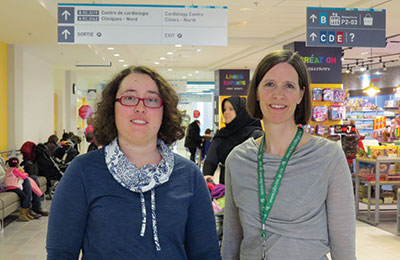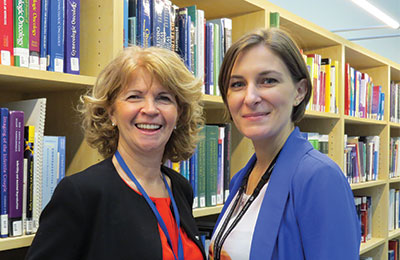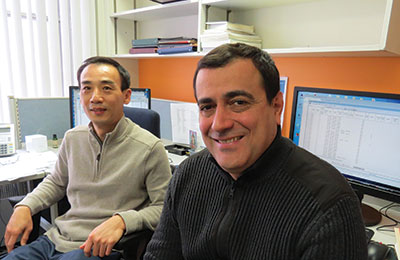Faces of the MUHC
As phenomenal as it is that modern medicine has evolved to the point where we can keep people alive with organs from others, there is a flip side. To prevent organ rejection, transplant recipients must take several medications a day for the rest of their lives. For patients, missing a few doses of anti-rejection drugs can have dire consequences on the viability of the graft. In the case of young patients, post-transplant care management represents a real challenge – a challenge that lies at the heart of the work carried out by a team from the Research Institute of the McGill University Health Centre (RI-MUHC).
Led by Dr. Bethany Foster, nephrologist at the Montreal Children’s Hospital of the McGill University Health Centre (MCH-MUHC), this team is attempting to identify the factors that support better medication adherence in young kidney transplant recipients and testing interventions to improve adherence. Research coordinator, project manager, statisticians and a postdoctoral student are using different research approaches with the objective of meeting a common challenge: to improve the kidney transplant success rate among children and teens in the long term.

It’s my clinical work as a pediatric nephrologist and as a member of the transplant team that motivates me to pursue this research. Transplantation is such a great gift; patients really do want to take care of their transplanted organs, but need better support to do so. – Dr. Bethany Foster, clinician scientist
The research team was the first to demonstrate that young kidney transplant recipients run a higher risk of losing their first transplant between the ages of 17 and 24, regardless of the age at which they received the transplant. This is likely due to the poor adherence to medication observed during the critical period of adolescence. The team recently demonstrated that these results also applied to children who received a liver or heart transplant.
“One of my team’s major strengths lies in our diversity of skills,” says Dr. Foster, who also serves as associate leader of the Child Health and Human Development Program at the RI-MUHC. “This versatility allows us to take on a project and use a variety of approaches. We do some studies where the focus is entirely on analysis of data from large databases. Other studies are observational studies in which patients participate, and other studies are clinical trials, where we test interventions in patients.”
Identification of obstacles to treatment adherence
The team is on the verge of completing an innovative clinical study under the name TAKE-IT. The study was conducted with 170 young patients recruited from several clinics across Canada and the United States. Launched in 2011 and financed by the National Institutes of Health in the U.S., this research project is aimed at testing a new intervention that would improve adherence to treatment among adolescent kidney transplant recipients. Participants are followed by a “coach” who helps them identify the personal obstacles they face and develop concrete solutions meant to mitigate the lack of attention to taking medication. Young patients also have the option of receiving text messages reminding them to take their medication.
“Recruiting and retaining participants in the project are crucial to the success of any clinical study,” says Diane Laforte, project manager within the team who actively managed the recruitment of patients in the TAKE-IT project. For Marie-Ève Alary, research coordinator, resourcefulness is the key. “We’re more active behind the scenes at the clinic, in the sense that we have to wait for the green light from the nurse to approach visiting patients we identified beforehand,” she explains. “Then we have to act quickly: we must explain to them what the research is about, answer all their questions and reassure them if they have concerns.”

I’ve been working at the MUHC for 27 years, and it’s always beautiful to see young people resume a practically normal life after transplantation. It’s amazing what science is able to do for these people. – Diane Laforte, project manager
What motivates me, in transplantation, is talking to the patients after everything they’ve been through, and seeing their health improve. What I like about my job is that it lets me save people in my own way. – Marie-Ève Alary, research coordinator
“We provide a bridge between researchers and patients. You have to enjoy being close to people, and you have to be able to manage your stress and maintain good interpersonal relations,” adds Mrs. Laforte.
The crucial role played by data analysis
Julie Boucquemont, a young postdoctoral student in biostatistics and epidemiology, who joined the team a few months ago, currently works on TAKE-IT data. She tries to identify risk factors that either influence adherence to treatment or have no influence on it, in order to encourage those who have difficulty following treatment. “What I like is not so much the human contact but the statistical models!” says Mrs. Boucquemont with a smile. “And while I don’t meet the participants personally, I still feel as though I have an impact on their lives.”
Dr. Foster’s team also includes other “stats enthusiasts” who play a vital role in advancing the researcher’s work. Mourad Dahhou and Xun Zhang, a pair of biostatisticians at the RI-MUHC, have spent eight years working on a major American database – the only one of its kind in the world – with the goal of extracting all kinds of relevant information on transplant recipients in the United States.
“I take care of processing data and identifying variables in an effort to find answers to Dr. Foster’s questions,” explains Mr. Dahhou. “For example, I can extract information on the life span of a transplant recipient versus a person undergoing dialysis and waiting for a transplant, and I can refine the analysis based on the person’s biological sex to determine if there are any differences between men and women.”

I take satisfaction in making discoveries that can be fascinating at times. And that drives me to continue the research. – Mourad Dahhou, biostatistician
For the researchers, this database is a gold mine of information on more than 1,000,000 people suffering from kidney diseases on various aspects of health. According to Dr. Foster, there are inadequate numbers of children and young adults with kidney transplants in Canada to answer many of the questions her team wants to address. No Canadian database similar to this one exists yet.
Mr. Zhang, for his part, works upstream of the process, helping researchers design their studies and ensuring that the analysis models provide the best possible answers to the questions they put forward. “I’ve been working at the RI-MUHC for 15 years. I love the research environment, and I’m proud to contribute to our researchers’ high-calibre publications.”
Identifying other factors in a hospital setting
The work of the team does not end there, however: it is also interested in the environment in which care is received and dispensed, always with the objective of promoting improved adherence to treatment. It was out of this continued interest that the POSITIVE multi-centre study – which is part of the Canadian National Transplant Research Program – came into being. Dr. Foster is one of the co-principal investigators in the project, which was financed by the Canadian Institutes of Health Research for a period of five years.
“In this study, we compile data from patients on adherence to treatment and their disease, but also – and this is new – we gather data from hospital staff, including nurses or chiefs of transplantation programs, with the goal of seeing if we can identify care-related factors that help patients take their medication or hinder them from doing so,” explains Mrs. Alary, who coordinates the POSITIVE project.
The research team is working closely with the Pediatric Renal Transplant Program of the MCH-MUHC, founded and directed by Dr. Lorraine Bell, without whom it would not be possible to complete clinical studies.
“In collaboration with Dr. Bell’s team, we are hoping to start an innovative study soon that’s particularly exciting because it includes both a young kidney transplant recipient and a parent as members of the study team,” explains Dr. Foster. “The goal is to gather detailed information from patients, parents, and members of the transplant team on how to integrate adherence interventions into clinical practice.”
